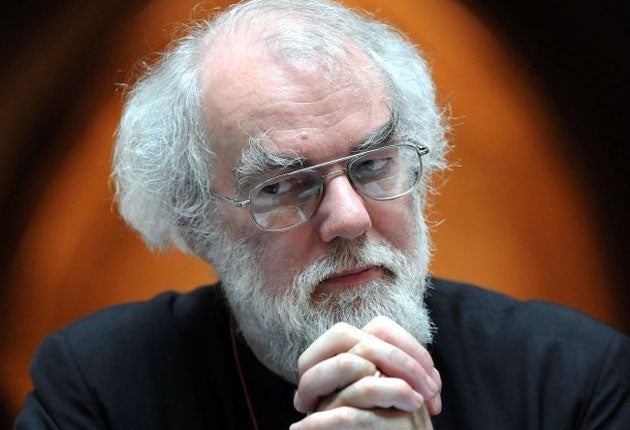'Desperately difficult' to keep Church together over women bishops

Your support helps us to tell the story
From reproductive rights to climate change to Big Tech, The Independent is on the ground when the story is developing. Whether it's investigating the financials of Elon Musk's pro-Trump PAC or producing our latest documentary, 'The A Word', which shines a light on the American women fighting for reproductive rights, we know how important it is to parse out the facts from the messaging.
At such a critical moment in US history, we need reporters on the ground. Your donation allows us to keep sending journalists to speak to both sides of the story.
The Independent is trusted by Americans across the entire political spectrum. And unlike many other quality news outlets, we choose not to lock Americans out of our reporting and analysis with paywalls. We believe quality journalism should be available to everyone, paid for by those who can afford it.
Your support makes all the difference.The Archbishop of Canterbury admitted today that it will be “desperately difficult” to keep the Church of England unified in light of its schismatic vote on women bishops.
In a heartfelt appeal for unity after a particularly fraught week, Dr Rowan Williams called on Anglicans to push ahead with the consecration of women bishops despite the fact that a minority of traditionalists, conservative evangelicals and Anglo-Catholics have threatened to leave the church over the issue.
The beleaguered church leader suffered an ignominious defeat on Saturday evening when the general synod – the church's legislative assembly – rejected his personal appeal for a series of safeguards that would have provided a separate class of male-only bishops to administer to those who remain vehemently opposed to female leadership in the church.
The issue has bitterly divided the church but in a speech to today's synod Dr Williams urged conservatives to resist the temptation to make any further attempts to stall legislation in favour of women bishops.
“It’s very tempting at times of stress and difficulty, such as we’ve been through in the last couple of days, to think: “We’ll drop it in the ‘too difficult’ basket”, the 60-year-old archbishop said. “I don’t really think that’s an option.”
His words clearly had an effect on the 484-seat synod which spent the entire day hammering out, often in terse scenes, the finer details of how women bishops will be consecrated.
A last-minute bid by conservatives to temporarily delay the legislation by six months was defeated overwhelmingly. The cause of women bishops will now go to individual dioceses for further debate before returning to the synod for final approval some time in 2012.
Wary of the anger among traditionalists, Dr Williams also appealed to liberals, who smell victory after years of campaigning in favour of women bishops, to be “generous” and accept some sort of arrangement for conscientious objectors who are opposed to female leadership.
“As the votes on Saturday illustrated, we remain as a Synod, it seems, committed by a majority to the desirability to seeing women as bishops for the health and flourishing of the work of God’s Kingdom in this Church and this nation,” Dr Williams said. “We’re also profoundly committed by a majority in the Synod to the maximum generosity that can be consistently and coherently exercised towards the consciences of minorities. We have not yet cracked how to do that.”
Although conservatives have failed to win absolute alternative measures set in stone, the church's legislative assembly has agreed to a clause which will “impose a duty” on any future female bishop to make arrangements for a working male bishop to provide some sort of oversight for conscientious objectors. What form those measures will take has yet to be decided.
As the day wore on, emotions became increasingly fraught, particularly among opponents of women bishops. A debate over the financial compensation of clergy who will lose valuable pensions if they leave the church was particularly tense.
Father David Houlding summed up the feeling of many conservative clergy members who will feel compelled to leave the church if women bishops goes ahead. “There are just scraps left of the table and we are beginning to starve,” he said, his voice cracking. “The door is being slammed in my face.”
Join our commenting forum
Join thought-provoking conversations, follow other Independent readers and see their replies
Comments